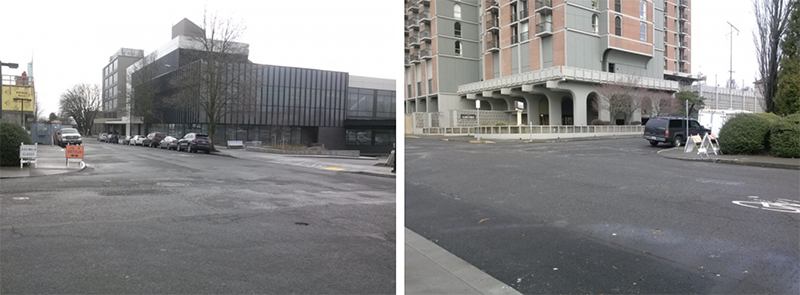Lloyd EcoDistrict: A Rehabilitating Community in Portland
In the North and Northeast sections of Portland, Oregon, the Lloyd District is a neighborhood with a commercial identity and not much else – until now. Before a big urban renewal push in the 1950s, the neighborhood was an African American residential community. Urban renewal displaced existing communities and brought in a hodgepodge of office buildings, hotels, condominiums and apartments, movie theaters, the Lloyd Center Mall and the Oregon Convention Center.
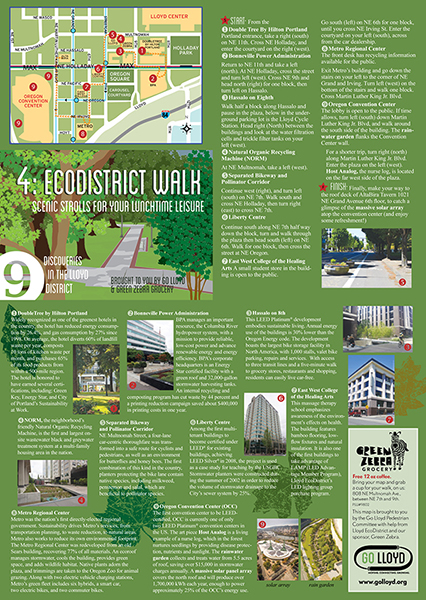 Last week, Living Future 2018 attendees had a chance to tour the Lloyd EcoDistrict, a “living laboratory for sustainability, pioneering collaborative community-scale solutions for social and environmental health.” The tour offered an all-encompassing experience of the EcoDistrict’s green roofs, bike lanes, water treatment systems, LEED buildings and more.
Last week, Living Future 2018 attendees had a chance to tour the Lloyd EcoDistrict, a “living laboratory for sustainability, pioneering collaborative community-scale solutions for social and environmental health.” The tour offered an all-encompassing experience of the EcoDistrict’s green roofs, bike lanes, water treatment systems, LEED buildings and more.
The EcoDistrict organization brings together “residents, organizations and businesses in Lloyd to educate, set goals, aggregate resources, and catalyze action” to reverse negative urban planning effects and incite positive ones.
The physical and cultural displacement of African American communities has been a persistent struggle throughout Portland’s history. While the EcoDistrict won’t be able to simply bring back the displaced communities, it is reversing damage and breathing new life into the area using the “EcoDistrict” framework.
All of the EcoDistrict programs and projects address one or more of the following neighborhood-wide goals:
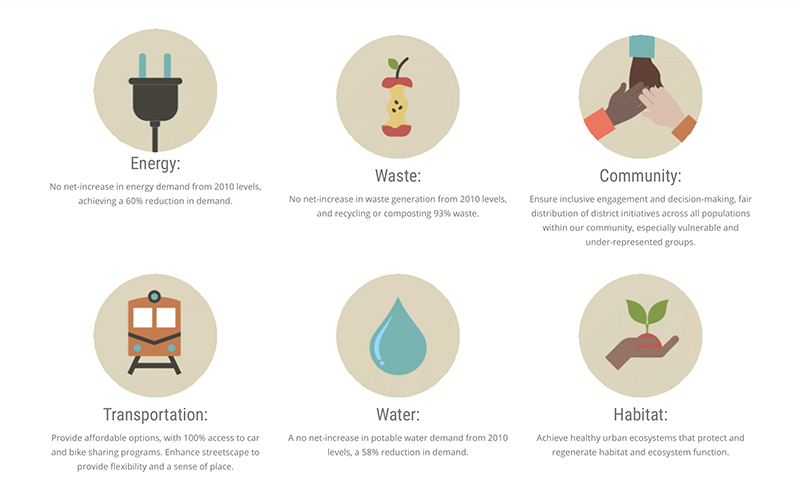
>Energy: No net-increase in energy demand from 2010 levels, achieving a 60% reduction in demand.
>Waste: No net-increase in waste generation from 2010 levels, and recycling or composting 93% waste.
>Community: Ensure inclusive engagement and decision-making, fair distribution of district initiatives across the populations within our community, especially vulnerable and under-represented groups.
>Transportation: Provide affordable options, with 100% access to car and bike sharing programs. Enhance streetscape to provide flexibility and a sense of place.
>Water: A no net-increase in potable water demand from 2010 levels, a 58% reduction in demand.
>Habitat: Achieve healthy urban ecosystems that protect and regenerate habitat and ecosystem function.
The projects:
Right 2 Dream Too (Equity)
“Right 2 Dream Too (known as R2DToo) is a rest area in Portland that serves the houseless community on a temporary basis. Its mission is to provide a safe place for people to sleep undisturbed. R2DToo was previously located in Old Town Chinatown, but it recently lost its spot due to development plans for the site at NW 4th and Burnside. Consequently, it has relocated its site to the Lloyd Neighborhood. Lloyd EcoDistrict is working with members of the residential and business communities to help R2DToo get situated in its new temporary site, so it can continue to serve the houseless population who need a safe place to recharge.” Projects include: sleep and recharge campaign, sleeping pods, mobile shower, laundry services, and spaghetti welcome dinners.
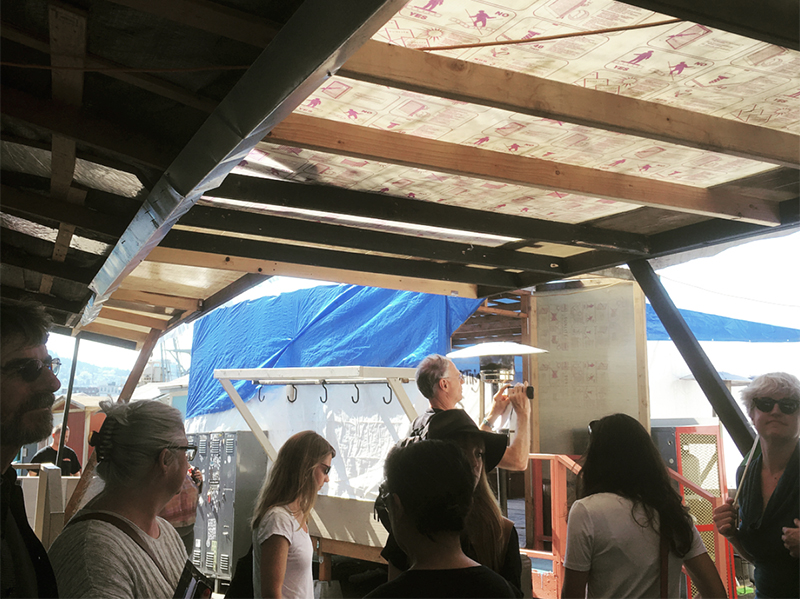
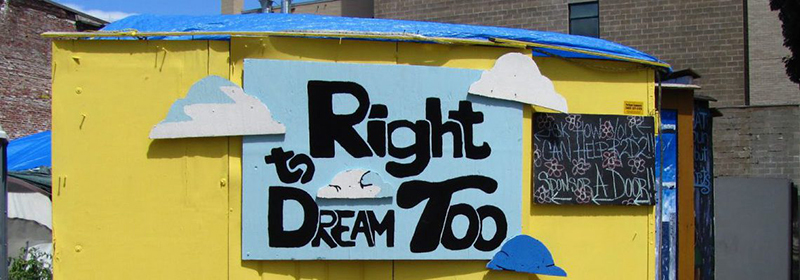
Age Friendly (Equity)
“Our partnership with Elders in Action (EIA) is an excellent example of how focused community development and investment pays long-term dividends for everyone in the district. The Age-Friendly Campaigns (AFCs) trained local senior volunteers to provide feedback to businesses on making their customer service and facilities more elder-friendly and accessible. For EIA, this proved a useful way to pilot a new approach to expanding its programs across the city, as well as connecting seniors with sustainability concepts. For Lloyd EcoDistrict it was a mutually beneficial method of engaging two key demographics in the district: seniors, who make up 25% of the resident population, and the businesses who serve them. Their vision of a sustainable living and working district includes an engaged, empowered resident population with connections to their local businesses; the AFCs are making that happen. All of this continues to pay off for the EcoDistrict by helping develop stronger relationships within the district that support a platform for future engagement within key performance areas.”
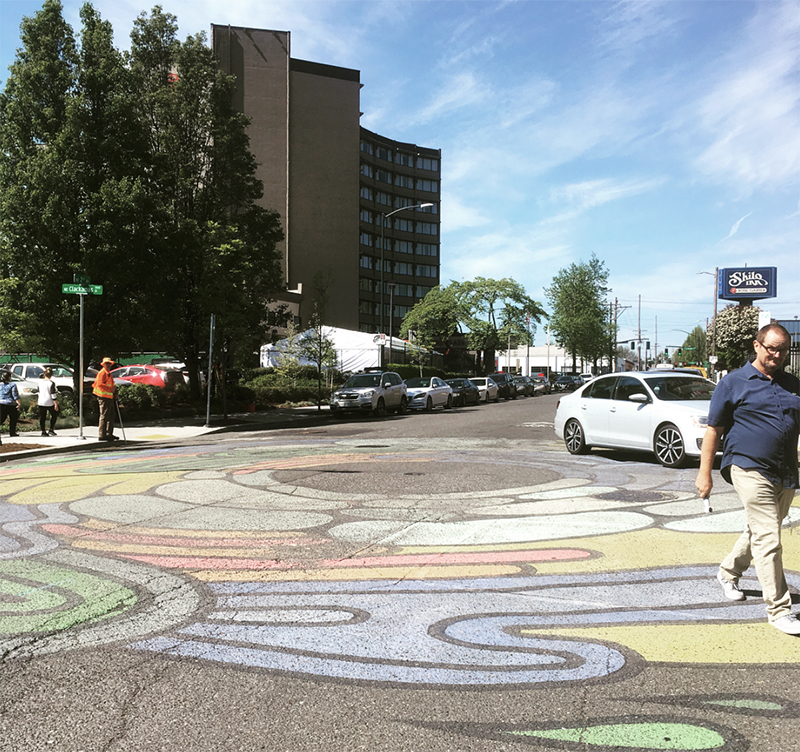
Pollinator Corridor (Equity, Transportation)
“In the spring of 2016, Lloyd EcoDistrict, in partnership with Go Lloyd and City Repair, began the first phase of a Pollinator Corridor. A pollinator corridor is a social sculpture that combines ecology, community engagement, and design. It serves to turn a pre-existing urban area – like a curbside or a rooftop – into a bustling environment for pollinator animals and bugs. As bee populations have steadily been declining, pollinator corridors in urban areas are a way to support the healthy growth of these communities. In June 2017, Lloyd EcoDistrict, City Repair, and volunteers with Wells Fargo completed the second phase of the corridor, expanding the project from NE 15th Avenue all the way down to NE 7th Avenue.
While several US cities have begun to develop pollinator corridors, this is Portland’s first. Not only that, but in planting the corridor along the NE Multnomah bikeway, we have established the country’s first official Pollinator Bikeway.
We’ve planted native perennials in the planters which, once established, will require much less watering and maintenance than annual varieties. In this portion of the corridor, you will find: kinnikinnick, milkweed,salal, and yarrow.”
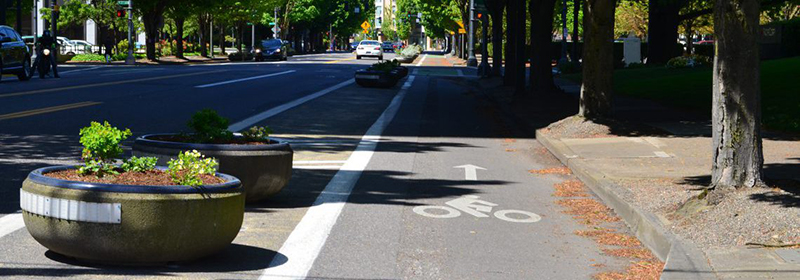
Waste Reduction Working Group (Equity, Waste)
“Lloyd has ambitious goals – by 2035 we will recover 93% of waste and we will generate the same amount of waste as current levels, despite development which is expected to triple the square footage of the district. Our stakeholders are working together to reach these goals following the strategies outlined in our five-year action plan to reduce waste in Lloyd.”
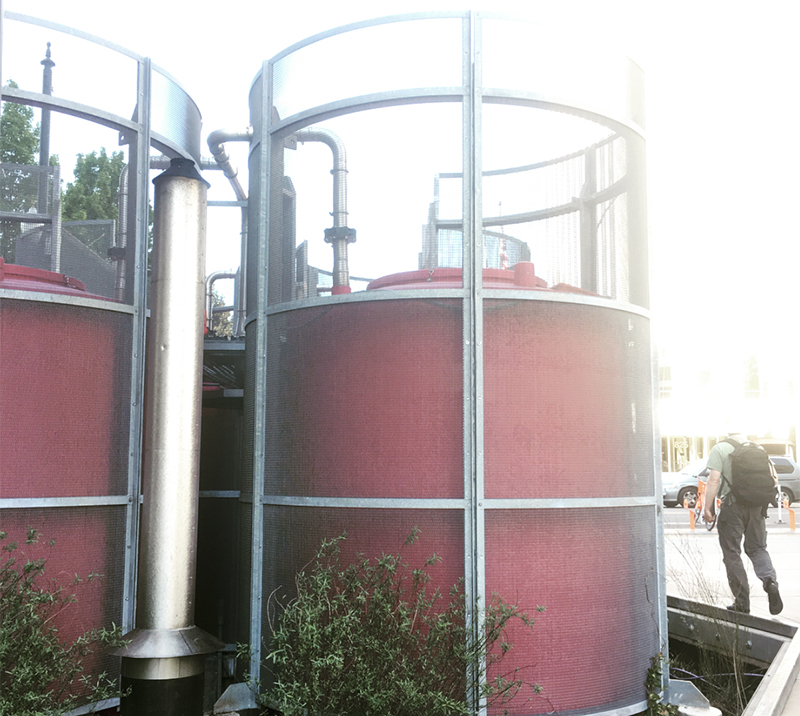
Lloyd E-Fleet Program (Equity, Transportation)
“Lloyd E-Fleet is an on-demand electric bike fleet for your employees and residents. Lloyd District has spearheaded two separate district-wide pilots aimed at introducing businesses and individuals to benefits of electric bikes. Lloyd EcoDistrict and our transportation partners see the adoption of a neighborhood e-fleet as a unique way to make Lloyd healthier, greener, and more efficient.”

District Utility Data Tracking (Energy, Water)
“Lloyd EcoDistrict monitors utility data for the district through ENERGY STAR® Portfolio Manager®. This free web-based tool allows building owners to track and analyze their electricity, gas and water use. By monitoring data through this system, we can see how effectively energy efficiency projects are helping the district reach its energy use reduction goals. And we know that simply by tracking utility data the usage numbers go down and the energy efficiency measures start to increase. This is the power of working together as a neighborhood.
100% of our district’s largest commercial buildings (larger than 50,000sf) have been tracking and sharing their energy data in ENERGY STAR® Portfolio Manager®. Each year, thanks to Green Building Services, this data is analyzed into a comprehensive report of our progress. Our 2016 report shows strong progress and leadership in energy efficiency as a district:
>Energy use in the district has been reduced by 12.4% since 2010.
>Median site EUI for Lloyd is 58.9 kbtu/ft2 compared to Portland’s median of 64.5 kBtu/ft2
>GHG emissions have declined by 21.4% since 2010 for buildings that have a full set of energy data
>Median Energy Star Score for Lloyd is 85, whereas the Portland median is 72
Energy Efficiency Working Group (Energy, Equity)
“The Lloyd EcoDistrict Energy Efficiency Working Group, or LE3, is a group of interested individuals from
utilities, city agencies, and local building who meet regularly to find creative energy efficiency solutions that we can work on as a neighborhood. These solutions work towards the district’s goal of “no net increase” in energy use by 2035. Over the next 5 years, 15 energy-related projects have been identified to meet this goal through concrete actions.
The LE3 provides a forum for Lloyd stakeholders to share results of energy efficiency projects, pool resources, and develop and promote new energy efficiency solutions for the EcoDistrict.”
Energy Action Plan (Energy)
“In 2014, the Lloyd EcoDistrict completed development of the Energy Action Plan. Created in collaboration with district stakeholders, technical advisors and key partners, the plan outlines fifteen actionable steps over the next five years in order to achieve the bold goal of no net increase in energy demand based on the 2010 usage baseline. With the rate of growth projected for the district, this equates to a 60% energy reduction by 2035. Several catalyzing actions were identified, including creation of the energy efficiency working group, establishment of the existing building energy protocol, energy benchmarking and monitoring, and a bulk purchase demonstration pilot. Learn more about this work in the Lloyd EcoDistrict Energy Action Plan.”
Intersection Mural Project (Equity, Transportation)
On Sunday, August 27th, 2017 The Lloyd EcoDistrict, in collaboration with Rather Severe and Color Outside the Lines, completed the first intersection mural in the Lloyd neighborhood! This project was supported by City Repair as part of their Village Building Convergence. Volunteers from Wells Fargo and Color Outside the Lines joined community members to complete the colorful vortex, which is adjacent to Calaroga Terrace, a senior living facility. Over the past year, we sought input on project locations and design ideas. The mural is located NE 2nd Ave and NE Clackamas St. Going forward, we hope to have a number of these projects throughout the neighborhood, building on the assets and talents of the people that live, work and play in the Lloyd EcoDistrict.”
Waste Reduction Action Plan (Waste)
“Starting in 2016, Lloyd EcoDistrict engaged in a year-long action planning process to identify the key strategies for reaching Lloyd’s goals of 93% recovery of waste and no net increase in waste generated. Working with stakeholders and technical advisors, and with support from Metro, the result was a five year action plan outlining fourteen key actions to reduce waste – with an emphasis on waste prevention. Many of the strategies in the plan aim to engage the public with community-building activities to strengthen public awareness of issues around waste, enhance visibility of environmental success in Lloyd and provide a way for individuals to participate in this important work.”

LAMP: LED Advantage Member Program (Energy)
Buildings within the Lloyd EcoDistrict can participate in an LED Advantage Member Program (LAMP). Each participating entity will support Lloyd EcoDistrict’s ongoing work to reduce greenhouse gas emissions. “Our work has already produced a 12% reduction in building energy use in just five years…A portion of proceeds from LAMP support Central City Concern, a social service and affordable housing provider.” Listed benefits to participating LAMP buildings are:
>EDs Lower Energy Use: 40-80% savings
>Great Payback: Typically two years or less for return on investment
>Charitable Benefits: A portion of proceeds help build affordable housing
>Competitive Pricing: Direct importer with strong supply chain and bulk purchasing
>Quality LED lighting Choices: Long-lasting LED replacements for virtually any fixture
>Excellent Service: Our experts manage product selection, audit, rebate paperwork and installation
>Trusted Contractor: Our vetted provider, Conserve Energy, is an Energy Trust Performance-Plus trade ally
